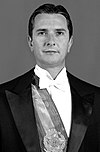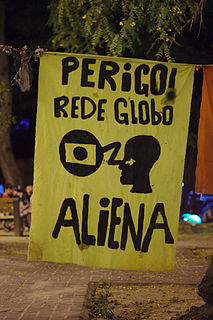| |||||||||||||||||||||||||
| |||||||||||||||||||||||||
| |||||||||||||||||||||||||
 |
|---|
| This article is part of a series on the politics and government of Brazil |
| Foreign relations |
Presidential elections were held in Brazil in 1989. They were the first direct presidential elections since 1960, the first to be held using the two-round system and the first to take place under the 1988 constitution.

Brazil, officially the Federative Republic of Brazil, is the largest country in both South America and Latin America. At 8.5 million square kilometers and with over 208 million people, Brazil is the world's fifth-largest country by area and the fifth most populous. Its capital is Brasília, and its most populated city is São Paulo. The federation is composed of the union of the 26 states, the Federal District, and the 5,570 municipalities. It is the largest country to have Portuguese as an official language and the only one in the Americas; it is also one of the most multicultural and ethnically diverse nations, due to over a century of mass immigration from around the world.

The two-round system is a voting method used to elect a single winner, where the voter casts a single vote for their chosen candidate. However, if no candidate receives the required number of votes, then those candidates having less than a certain proportion of the votes, or all but the two candidates receiving the most votes, are eliminated, and a second round of voting is held.
Contents
- Historical context
- The election
- The candidates discourse and biased coverage
- Opinion polls
- First round
- Second round
- Results
- References
- External links
In the first round, Fernando Collor de Mello led the field, but came up well short of the required majority. After receiving 453,800 (0.6% of the total votes) more votes than Leonel Brizola from the Democratic Labour Party, a symbol of the old left-wing, Luiz Inácio Lula da Silva from the Workers' Party proceeded to the second round against Collor. Collor won the second round by a margin of 6%, making them the closest presidential elections in Brazilian history until 2014.

Fernando Affonso Collor de Mello is a Brazilian politician who served as the 32nd President of Brazil from 1990 to 1992, when he resigned in a failed attempt to stop his impeachment trial by the Brazilian Senate. Collor was the first President directly elected by the people after the end of the Brazilian military government. He became the youngest president in Brazilian history, taking office at the age of 40. After he resigned from the presidency, the impeachment trial on charges of corruption continued. Collor was found guilty by the Senate and disqualified from holding elected office for eight years (1992–2000). He was later acquitted of ordinary criminal charges in his judicial trial before Brazil's Supreme Federal Court, for lack of valid evidence.

Leonel de Moura Brizola was a Brazilian politician. Launched in politics by Getúlio Vargas, Brizola was the only politician to serve as elected governor of two Brazilian states, before and after the 1964-1985 military dictatorship. In 1958 he was elected governor of Rio Grande do Sul, and in 1982 and 1990 he was elected governor of Rio de Janeiro. He was also vice-president of the Socialist International and served as Honorary President of that organization from October 2003 until his death in June 2004. One of the few Brazilian major political figures able to overcome the dictatorship's twenty-years ban on his political activity, Brizola was a non-Marxist Left nationalist who successfully recycled his political agenda to cope with a post-Cold War setting. His later party, the Democratic Labour Party, practiced a form of social democratic, left-wing politics based on a form of populism derived from earlier Varguism, a highly nationalistic social democratic mass movement.

The Democratic Labour Party is a social democratic political party in Brazil.























